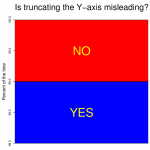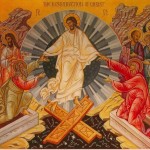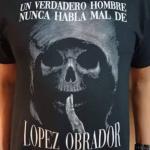You can listen to “Fights in Good Faith,” my weekly radio program, streaming today at 5pm ET and tomorrow (Sun) at 1pm. The audio is now up for streaming at my show’s page.
Plus, this Monday, you can come see me speak in person in San Francisco.
Every week, I put up a “Radio Readings” post, so you can track down the books, articles, and, this week: Passover songs(!) that I cite on the show. So, without further ado, here’s what I’m talking about this week.
Reading Out of Your Depth
- “A language that doesn’t affect the way you think about programming, is not worth knowing.” — Alan Perlis, from “Epigrams on Programming”
- “Learn a new language, grow a new soul.” — Czech proverb
- Book recommendation from the blog commenters: Oliver Sacks’s Uncle Tungsten: Memories of a Chemical Boyhood
Uncle Tungsten by Oliver Sacks uses his own curiosities and experiments in childhood to explain fundamental questions in chemistry, then moves to the big players in figuring out that question. He talks about each obstacle they had and how they got around it, then highlights the series of logic leaps that get to the real problem. So you don’t even realize you’ve learned chemistry knowledge, you just have this timeline of creating fundamental ideas, and unlike chemistry class where everything is shown to you as what simply is, this gives you the context and uses it to make an interesting story. I learned a lot about how to present ideas, especially without using any numbers. For the periodic table especially, there’s good deep reasons why it’s built like that, and I never knew them through four classes of chemistry. The book taught me those reasons without me realizing.
(I’ve put Uncle Tungsten on hold at the library on the basis of Adam’s recommendation, maybe you’re also one of today’s lucky 10,000?)
Mapping the Limits of What Can be Known
- From Scott Aaronson’s Quantum Computing Since Democritus:
In science, there’s this traditional hierarchy where you have biology on top, and chemistry underlies it, and then physics underlies chemistry. If the physicsts are in a generous mood, they’ll say that math underlies physics. Then, computer science is over somewhere with soil engineering or some other non-science.
Now, my point of view is a bit different: computer science is what mediates between the physical world and the Platonic world. With that in mind “computer science” is a bit of a misnomer, maybe it should be called quantitative epistemology.” It’s sort of the study of the capacity of finite beings such as us to learn mathematical truths.
- This is a pretty friendly introduction to “Big O” notation, which I talk about in this segment. It’s basically how computer scientists talk about how fast a program could run (in the worst case scenario).
- The Four Color Theorem (can you color in a map with only four colors, without having any two countries with the same color touch each other?) was the first major proof done by computer. (A program cranked through about 2000 specific cases and brute-force checked them)
Saying “Dayenu” When You Read
- “Dayenu” means “it would have been enough” and is the name of a Passover song (see below) that names what God has done for his people, noting that each would have been dayenu in itself, but that God did more.
(Fun fact, while finding links for you, I learned this: “In Israeli screenings of The Rocky Horror Picture Show, after the line, ‘if only we hadn’t made this journey… if only the car hadn’t broken down… oh, if only we were amongst friends… Or sane persons,’ the audience sings the chorus of ‘Dayenu.'”) - Gödel Escher Bach: An Eternal Golden Braid is a book I read with a dayenu spirit. I gave up about five-sixths of the way through the first time, still got a lot out of it, and came back to finish it three years later.
- When I was a curriculum developer at the Center for Applied Rationality, I made sure to structure my classes with an eye to dayenu moments, so that you didn’t need to understand or remember everything to benefit from the lesson. (Incidentally, today is the final day of CFAR’s yearly fundraiser, when your donations will be doubled).
Steering Toward Joy
- China Miéville, author of The City & The City and Perdido Street Station on reading out of his field, in an interview in The Believer:
What I love is passion. One of my fascinations is trade magazines. I love picking up specialists’ magazines about subjects I know nothing about. For instance, you pick up a magazine that is the house journal of tropical-fish keepers or model-train builders. I have no interest in model trains; I have no interest in tropical fish, but I love reading the magazines, because you get this insight into this world of debate and passion and argument, and then you get two competing magazines with different platforms who are dissing each other because this is a world where the people involved in it are absolutely in love with what they do. What geeks have, geeks in any field, be it a field like science fiction or a field like tropical fish, is that they are moved to do what they do because of a love and passion for the field above all else.
- Amber Benson (Tara on Buffy the Vampire Slayer and now a director, herself) from an interview by AV Club:
I always ask questions. I find the people that do creative, interesting jobs want to share the information. They love questions. I would be like this little kid on set. I’d walk up to the gaffer and go, “What’s that thing around your neck? What are you doing?” The first big thing I did was a movie called King Of The Hill that Steven Soderbergh directed. We were staying in this hotel in Saint Louis and they had turned the Kiel Auditorium into all the different sets for the film, which takes place in Saint Louis during the Depression. We were shuttled back and forth from the set. I remember sitting next to Soderbergh and asking him, “What makes a good director?” I was 14, this total obnoxious little kid, and he was like, “You cast well.” And I thought, “That is the greatest piece of information ever.” He’s totally on the money. Yeah, I ask questions. I’ve found if you ask people questions, you learn.
- And, from E.L. Konigsburg’s The Mixed Up Files of Mrs. Basil E. Frankweiler, in response to the idea you should learn something new every day:
“No, I don’t agree with that. I think you should learn, of course, and some days you must learn a great deal. But you should also have days when you allow what is already in you to swell up inside you until it touches everything. And you can feel it inside you. If you never take time out to let that happen, then you just accumulate facts, and they begin to rattle around inside of you. You can make noise with them, but never really feel anything with them. It’s hollow.”
Bonus content for this week is my list of books that made the world seem larger/gave me new ways to think that people might not ordinarily pick up. (I’m painfully excluding things like The Emperor of All Maladies and Seeing Like a State, which were excellent, but precisely in the domain I expected them to be when I picked them up).
- Scott Aaronson – Quantum Computing Since Democritus
- Edwin Abbott – Flatland: A Romance of Many Dimensions (also, by other authors: Sphereland and Flatterland)
- Robert Gilmore – Alice in Quantumland
- James Gleick – Chaos: Making a New Science
- David Graeber – Debt: The First 5000 Years
- Douglas Hofstadter – Gödel Escher Bach: An Eternal Golden Braid
- Thomas Schelling – The Strategy of Conflict
- Tom Stoppard – Arcadia
I bet I’ve still missed some of mine, and I know I don’t know all of yours. Please share them in the comments.















